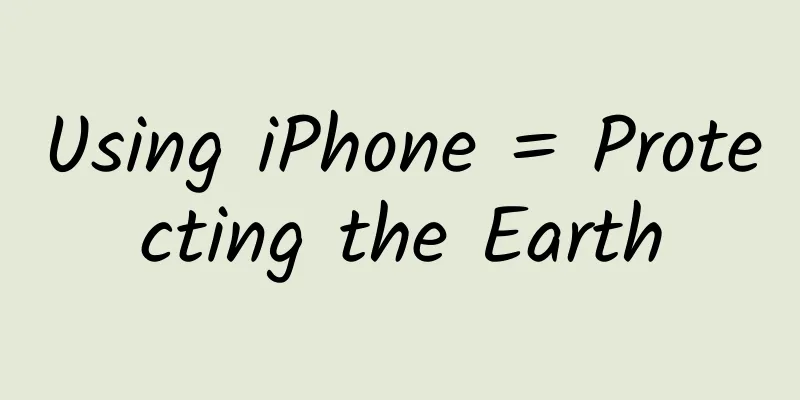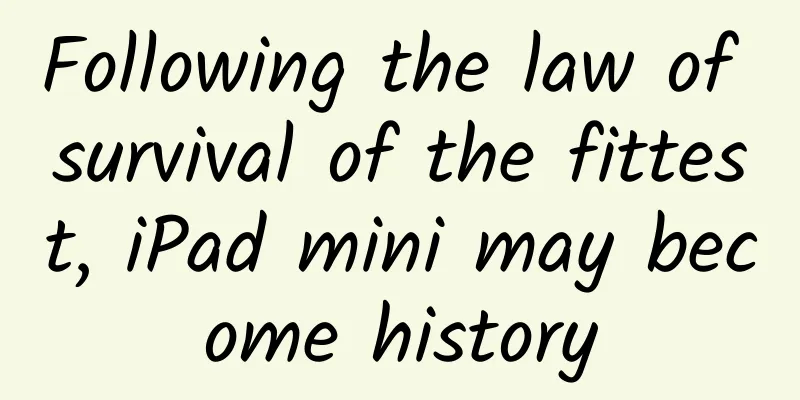Using iPhone = Protecting the Earth

|
June 5th of every year is World Environment Day, but it seems that the media is more focused on this month, that Apple's upcoming iPhone 6 will create a new sales record. After the configuration and spy photos were exposed one after another, the media has recently exposed various latest news about Apple's iPhone 6. It is reported that Foxconn has received production orders for up to 90 million Apple iPhone 6s, and there are two screens, 4.7 inches and 5.5 inches. The 4.7-inch iPhone 6 will be released on September 19, 2014. I also noticed that many of my friends and colleagues have been eager to try it out, and can't wait to have a "latest version of iPhone" as soon as possible through various channels. Interestingly, among these enthusiastic buyers, some even just bought the previous generation iPhone 5S a few months ago, but the attraction of iPhone 6 is also irresistible to them. After all, owning the "latest version of iPhone" seems to be more like a symbol of status for many people. Of course, I can accept all kinds of reasons for buying iPhone 6, after all, it is human nature to get tired of the old and like the new. Until recently, a friend told me that he wanted to replace his iPhone 5S with the latest iPhone 6 because he saw various advertisements saying that iPhone 6 is more environmentally friendly, so he also wanted to make his own contribution to this increasingly polluted earth. Okay, stop it, I can't accept this reason. In fact, I can't find a more ridiculous reason than this! Since the launch of iPhone 4 in 2010, Apple has been promoting that its mobile phones are more environmentally friendly than its competitors. iPhone phones, headphones and USB chargers are made of environmentally friendly materials that do not contain polyvinyl chloride. In addition, they also include bromine-free circuit boards, mercury-free LCD displays and arsenic-free screen glass. Recyclable fiberboard and bio-based materials are also used in packaging, and power adapters and energy supplies also exceed strict global energy efficiency standards. In fact, there is nothing to blame. Don't all the big companies in the world that claim to be "green and environmentally friendly" promote their products in this way? I don't want to promote how bad it is to adopt the latest greener and more environmentally friendly technologies and products. In fact, most new products are more energy-efficient and environmentally friendly than the previous generation, which is beyond doubt. I have no hostility towards these innovative manufacturers, but I am worried that this will go to the other extreme. First of all, I want to point out that Apple's iPhone is not a very environmentally friendly or green product. The first generation of iPhone was once found by green environmental organizations that some components used harmful chemicals such as brominated flame retardants and polyvinyl chloride (PVC). Of course, Apple later made corrections. However, the battery of the iPhone has not been detachable in the usual way, but has been welded and pasted to the phone. This has caused trouble for replacing the battery, and has also made it difficult to separate, recycle and treat it, not to mention the increased burden of electronic waste treatment. Not long ago, green environmental organizations still found traces of chemical elements such as bromine, chlorine, lead, and mercury in the components of the iPhone 5. Once the phone is broken or melted as waste, these chemicals may pose risks. What needs to be vigilant is that the iPhone recycling conducted by green environmental organizations shows that less than 10% of the iPhones sold flow into the recycling channel. In addition, like the previous iPhone, the new generation of iPhone 6 was released globally, but it was mainly processed and produced in China. As the center of the world's IT product processing industry, China's ecological environment is paying a price, especially the heavy metal pollution caused by the production of printed circuit boards (PCBs) and battery power supplies, which is particularly serious. For this reason, many Chinese environmental protection organizations have been sending letters to Apple questioning heavy metal pollution. In sharp contrast to the high-profile press conference, Apple has remained silent on the questioning of heavy metal pollution in the supply chain. I don't want to blame Apple for the iPhone. iPhone fans can also argue that other mobile phone manufacturers have not done better. In addition, heavy metal pollution seems to be the responsibility of suppliers. However, I still want to emphasize that because Apple has been promoting its green commitment in a high-profile manner, it means that consumers who buy its products also buy a commitment. Apple, which relies almost entirely on outsourcing production, will violate its commitment if it allows suppliers to violate regulations and exceed emission standards. Consumers have the right to demand that they make corrections. Even those IT idealists who believe that high technology can solve all environmental problems must first face up to such a reality-with the rapid development of high-tech, the cycle of electronic product replacement is getting shorter and shorter, and the resulting electronic waste is growing at an annual rate of 18%. Electronic product components contain hundreds of highly harmful chemicals such as lead, bromine, beryllium, chromium, and cadmium, so electronic waste is becoming the largest source of pollution for mankind. Among them, as IT products are increasingly becoming mass consumer goods, and the upgrading trend is accelerating due to the pursuit of new technologies, the huge scale of pollution is no longer comparable to that of heavy industry. Take the printed circuit board (PCB) that is indispensable in IT products as an example. Its production process produces a large amount of pollutants such as total copper, nickel, and chromium. In China, a large number of PCB manufacturers cannot stably meet emission standards, which will cause serious pollution to local rivers, soil and offshore. Moreover, even if the words "green and energy-saving" are used on the label, it does not mean that the product is commendable. Imagine, if some components contain a high content of toxic hexavalent chromium but save 7% of electricity, then is it really better for the environment? If the cost of providing "energy-saving" technology products to users is a large amount of industrial pollution, or if the recycling of energy-saving products is simply handled, resulting in waste pollution, then isn't this the biggest irony of "green technology"? Not long ago, the professional testing organization HealthyStuff cooperated with iFixit to dissect 36 mainstream smartphones on the market, studied the toxicity of mobile phones through chemical composition analysis, and made a ranking list. An interesting phenomenon is that the later the mobile phone is, the more environmentally friendly it is, but it is more surprising that the iPhone 4S is better than the iPhone 5. It is one thing to talk about something being more environmentally friendly, but whether it can actually be better, safer and less harmful to the environment is another. We can only say that some manufacturers are indeed responsive, just saving a little electricity or complying with laws and regulations, and they can boast that they have launched "environmentally conscious" new products or services. The key to the problem is, can these manufacturers really ignore the bigger problems brought about by these products? What needs to be more vigilant is that many times, people's concept of what green living is is greatly misled. For many people, since green has become a fashion, there are many ways to spend money to prove that we care about the planet, but in fact it is just showing off their own financial strength. To give a simple example, in daily life, we wear more and more organic cotton clothes, which quickly replace the original chemical fiber products, but this has no real impact on the environment, so we can no longer pretend to be environmentally friendly by buying things. In the final analysis, thriftiness is the most effective way to protect the environment. What people need is to greatly reduce the amount of shopping, not to improve the quality of shopping. We must greatly reduce our consumption. To be honest, when you buy a new computer or mobile phone, is it because you need it or because you want it? A wise way to become a green technology enthusiast is to buy new equipment less often. This restraint will reduce your "contribution" to the production and disposal of waste-and the longer you wait, the more likely you will buy a cleaner and faster machine when you buy a new machine. There is no doubt that green represents the development direction of today's leading technology. The reason why green has attracted much attention is not only because it represents leading technology, but also because of its practical significance of energy conservation and emission reduction. Green consumption in the true sense means that in consumption activities, not only the consumption needs, safety and health of human beings must be guaranteed, but also the consumption needs, safety and health of future people must be met. Green consumption is not "consuming green". Some people do not eat non-green food, but they also eat rare animals; they do not use non-green products, but they throw away plastic bags; they do not use non-green building materials when decorating their homes, but they are keen on competing with each other when decorating. Their so-called green consumption behavior is only based on their own interests and health, without considering the protection of the environment, which goes against the original intention of green consumption. If you think that green consumption means eating natural food, wearing clothes made of natural materials, decorating rooms with natural materials, traveling to primeval forests, etc., this is actually a misunderstanding and may even lead to another form of overconsumption. For the mission of "saving the earth", give up people's desire for technology, beauty and life? Perhaps the most radical environmentalists do not think so. In fact, green consumption must take the protection of "green" as the starting point and the principle of not harming tomorrow's consumption to achieve sustainable consumption. Undoubtedly, we cannot abandon computers and mobile phones and go back to the past, but with the help of new technologies, especially new concepts, we can at least make the process of using computers and mobile phones more "green" and "environmentally friendly", and build a healthy world for ourselves and our environment. As a winner of Toutiao's Qingyun Plan and Baijiahao's Bai+ Plan, the 2019 Baidu Digital Author of the Year, the Baijiahao's Most Popular Author in the Technology Field, the 2019 Sogou Technology and Culture Author, and the 2021 Baijiahao Quarterly Influential Creator, he has won many awards, including the 2013 Sohu Best Industry Media Person, the 2015 China New Media Entrepreneurship Competition Beijing Third Place, the 2015 Guangmang Experience Award, the 2015 China New Media Entrepreneurship Competition Finals Third Place, and the 2018 Baidu Dynamic Annual Powerful Celebrity. |
<<: In fact, Optimus Prime was killed by Shuhua Milk in the end...
>>: China Telecom's future goal: popularize "20M broadband"
Recommend
How to improve the efficiency of App’s invitation mechanism?
The App invitation mechanism is a feature that al...
The body has 3 signs of kidney health! What to eat to nourish the kidneys?
Experts in this article: Wang Bin, Department of ...
With a R&D team of thousands of people, why is NIO’s intelligent driving progress two steps behind the industry?
Sometimes, what is more regrettable than having n...
Unveiling the mystery of "traffic hijacking"丨Hijacking 50,000 IP traffic and earning at least 30,000 per month!
You clearly opened website A, but for unknown rea...
How much does it cost to join Datong Rubber and Plastic Mini Program?
How much does it cost to join the Datong Rubber a...
Why is the copywriting of "Jiang Xiaobai" so popular!
I don’t know if you have noticed, but there is a ...
Alibaba's new AI technology turns ordinary people into dancing masters in seconds
At the beginning of 2024, social media and WeChat...
6 tips to quickly improve UI design effects
Editor's note: When designing a UI, there are...
Douyin, Kuaishou, Xiaohongshu, and Bilibili, which one has a lower advertising ceiling?
In October, the article "Watching Douyin and...
From no idea where to start to countermeasures, Suning Financial's mobile login optimization method
[Original article from 51CTO.com] The ancients sa...
Why is it said that “Huaiyang cuisine” may be a fake cuisine?
Written by Wei Shuihua Header Image | Who is the ...
The ultimate energy that humans pursue is hidden in this terrifying weapon
Recently, with the major scientific and technolog...
Analysis of 14 excellent case strategies in 7 major information flow industries!
This article shares with you excellent case analy...
Douyin short video operation course live broadcast self-media operation tutorial zero-based training Douyin store Qianchuan
Douyin short video operation course live broadcast...









